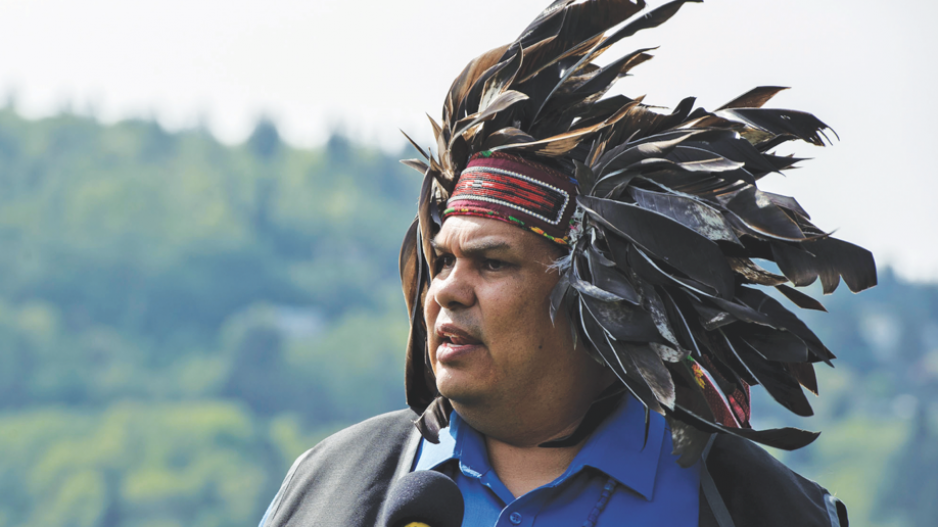Part 4 of a special project in partnership with JWN Energy Group
There are 133 First Nations living along or near the Trans Mountain pipeline corridor in Alberta and B.C., 40 of which have granted their support for the project and signed benefits agreements.
“We have the vast majority of the right-of-way communities impacted by this project supporting it,” Kinder Morgan Canada president Ian Anderson recently told the Greater Vancouver Board of Trade. “We have far more support in aboriginal communities than we have opposition.”
But the one First Nation that is arguably the most important, the Tsleil-Waututh, has been unwavering and unanimous in its opposition to the pipeline-twinning project, and has been successful in rallying public support to its cause.
Other Lower Mainland First Nations – the Musqueam, Squamish and Kwantlen – are also opposed to the project, but none have been as vocal as the Tsleil-Waututh, which is not surprising given where they live.
The Trans Mountain pipeline terminates in Tsleil-Waututh territory on Burrard Inlet, where the Westridge Marine Terminal is located and which would receive 34 oil tankers per month, if the twinning project is approved.
Fighting the pipeline has become something of a full-time occupation for Reuben George, grandson of the late Canadian actor Chief Dan George.
Although he’s not an elected band member, George has the backing of the elected council and is manager of the Sacred Trust, a campaign devoted to opposing the pipeline’s expansion
Reuben is confident the Tsleil-Waututh would win a legal battle, if it comes to that, based on numerous legal precedents affirming First Nations’ rights and title in unceded territory.
“We’ll do what it takes, legally; we’ll do what it takes, period.”
The Tsleil-Waututh and five other First Nations have filed for judicial reviews on the pipeline expansion, a number of which were dismissed by the Federal Court, although there are still other legal challenges they can launch, if the project is approved.
A succession of Supreme Court of Canada decisions over the last 30 years have incrementally strengthened the position of First Nations with respect to having a say on resource development in their traditional territories.
But contrary to popular opinion, nothing in Canadian law gives First Nations a veto over projects deemed to be in the greater public interest, says Robin Junger, a McMillan LLP lawyer specializing in aboriginal law. Even reserve or treaty land can be expropriated for things like roads and pipelines.
“The bottom line is that our courts – right to the Supreme Court of Canada – have made very clear that aboriginal rights must be taken seriously, but they’ve made equally clear that aboriginal groups do not have a veto,” Junger said.
The United Nations Declaration of the Rights of Indigenous People (UNDRIP), which requires “free, prior and informed consent” for resource development, is not enshrined in Canadian law and is considered more of a statement of principle. But the Trudeau government made a show of formally endorsing the declaration in May at the United Nations, setting up an expectation among First Nations that they would, in fact, have more say over resource development in their territories.
But just two months later, in July, Jody Wilson-Raybould – the B.C. Kwakwaka’wakw First Nation MP and federal justice minister – told the Assembly of First Nations the UNDRIP is currently “unworkable” within Canada’s constitution and Indian Act.
“So as much as I would tomorrow like to cast into the fire of history the Indian Act so that the Nations can be reborn in its ashes, this is not a practical option. Which is why simplistic approaches, such as adopting the UNDRIP as being Canadian law, are unworkable and, respectfully, a political distraction to undertaking the hard work required to actually implement it,” she said.
Lack of veto power may have led 40 First Nations along the pipeline route to sign benefits agreements and formally write to the NEB in support of the project.
The Tk’emlups te Secwepemc (Kamloops Indian Band), for example, originally opposed the project. But in a letter of support submitted to the NEB, the First Nation withdrew its original opposition. So have the Nicomen Indian Band, near Lytton, and the Yale First Nation in Hope.
First Nations leaders in communities that signed benefits agreements are sometimes reluctant to speak publicly about their decision to back the project, for fear of criticism – both within their own communities, which can be divided, or from neighbouring First Nations.
By signing agreements, some First Nations say they will at least have some input on mitigating impacts, and realizing benefits.
For the Yale First Nation, a benefits package was hard to turn down. The band had hoped that a treaty would have provided economic development opportunities in an area hit hard in recent decades by a decline in resource industries like mining and forestry.
But those hopes evaporated when the band decided against implementing a treaty. Along with the treaty vanished whatever benefits might have flowed from it.
So, there was pressure to accept a benefits agreement in exchange for formally supporting the pipeline expansion.




